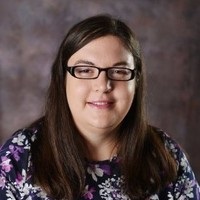Elizabeth Strong
"I came into the iSchool wanting to make a career change from K-12 education, and working for a tech company is not where I originally saw myself, but it's a perfect fit that combines my previous skill set with the interests that led me to Information Studies."
At Duolingo, I work with language experts to help them apply the understandings we've gained from user data and internal testing to writing and revising the content that you actually see in the app in a way that will give you the most effective, well-scaffolded, and enjoyable language learning experience. The key skill that helps me in everything I do is communication. Duolingo is an organization where software engineers, designers, UX researchers, and linguists have to be able to collaborate to make the best improvements to our product, so it's important to be comfortable with the technical vocabulary used by members of other functions and to be able to explain your own expertise in a way that makes sense to others. I use the same skills that I learned in my museum internships for writing interpretive text that is comprehensible to a wide audience when drafting curriculum guidelines for non-linguists. My informational interviews with librarians also taught me the importance of being able to develop a wide breadth rather than just a singular depth of knowledge. I am one of the company's "generalist" curriculum designers, meaning that I was hired to consult on a variety of languages rather than to work as an expert in one particular language, so it's vital that I'm able to find out the most important details about a language I'm not familiar with and to do so quickly, and that involves evaluating what the best sources of information for a new project will be.
I came into the iSchool wanting to make a career change from K-12 education, and working for a tech company is not where I originally saw myself, but it's a perfect fit that combines my previous skill set with the interests that led me to Information Studies. I would advise students seeking employment that whatever past experiences and affinities you bring to the table are an asset that you should not overlook. Even knowledge that you've gained from a hobby can be something that sets you apart and provides you with a new opportunity - this was true when I started my career as a music teacher after a linguistics degree, and just as true when I pivoted from three years of museum and archival internships to apply to a job working on "that app I use to learn Irish for fun." You might have a very clear vision for what you want to do when you graduate, but being flexible enough to take some classes outside of that area while you're in school and to explore employers outside of that area during your job search can yield pleasant surprises. I would also suggest that whatever you end up doing, make sure you look for a position where you align with the mission and culture of the organization. Those elements will have as much of an impact on your happiness as the particular tasks you do each day, if not more.

